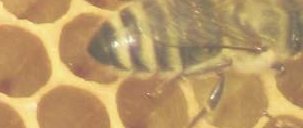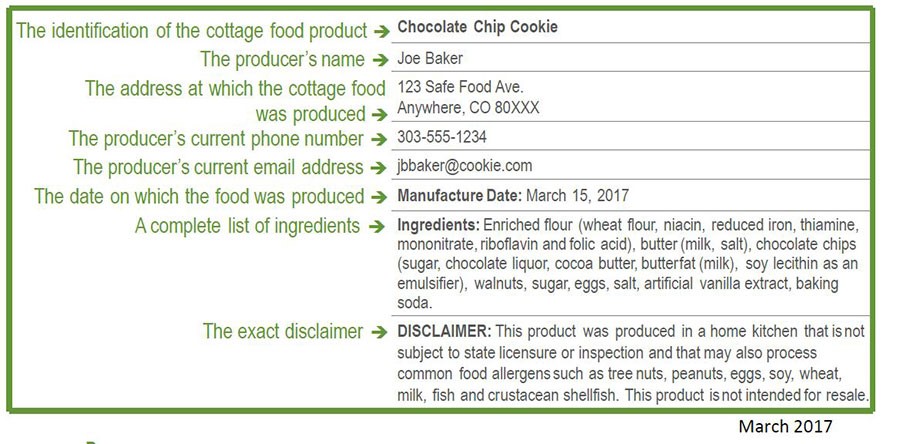
Selling Honey in Colorado
You may be able to sell your honey under the Colorado Cottage Food Law. This reduced set of requirements applies to those honey operations processing in home kitchens that only sell directly to the consumer and have gross sales receipts of $10,000 or less, per type of item sold.
Summary: Small-scale honey operation: the Cottage Food Law applies to those honey operations processing in home kitchens that only sell directly to the consumer and have gross sales receipts of $10,000 or less, per type of item sold.
Be sure to see this page about Colorado Cottage Food laws.Providing Safe Samples
Samples must be offered in a sanitary manner using single-use service items such as disposable spoons, toothpicks, or wooden sticks. Servers should wear gloves when preparing samples and/or use clean utensils when handling samples. Customers must not be allowed to dip directly into products, and precautions to avoid contamination must be taken.
Food Safety Concerns
Few food safety problems have been associated with honey. Most microorganisms do not grow in honey because of its low water activity. However, honey sometimes contains dormant endospores of the bacterium Clostridium botulinum. Therefore, it is recommended that honey not be given to children younger than 12 months.
Packaging
It is recommended that each container be filled with honey as full as practicable; the honey should occupy not less than 95% of the total capacity of the container, be packaged in food grade glass or plastic, and stored at room temperature. Honey should be protected from oxidation and temperature degradation. Excessive heat can have detrimental effects on the quality of honey; generally, large temperature fluctuations should be avoided. All products must display Colorado Cottage Foods label.
Labeling
You are exempt from the FDA nutritional label requirements as a cottage food producer since your sales cannot exceed $10,000 per item annually. You are, however, required to display all labeling information required by the Colorado Cottage Foods Act as shown below.
A cottage food operation may only sell products offered with a label containing the following information (printed in English):

Resources
- Colorado Farm to Table: http://farmtotable.colostate.edu
- Colorado Farm to Market: http://cofarmtomarket.com
- Honey Fact Sheet
Colorado Cottage Foods Act
Colorado Senate Bill 12-048 allows individuals to produce, sell, and store a limited number of specific, non-potentially hazardous ‘cottage food’ products, in a home kitchen. Cottage food businesses require no license or permit from the Colorado Department of Public Health and Environment and are not inspected by any state or local government entity. Products must be sold directly by the cottage foods operator to an informed end consumer and gross sales for each product produced must not exceed $10,000 annually. Sales outside of the state of Colorado are prohibited.
Allowed Cottage Food Products in Colorado
A limited range of foods that are non-potentially hazardous and do not require refrigeration are allowed. These foods include spices, teas, dehydrated produce, nuts, seeds, honey, jams, jellies, preserves, fruit butter, flour, baked goods including candies, fruit empanadas, and tortillas, and pickled fruits and vegetables.
Food Safety Training
Although a cottage food kitchen does not require licensure, the producer does need to obtain food safety training. The Colorado Cottage Food Act requires “a producer must take a food safety course that includes basic food handling training and is comparable to, or is a course given by, the Colorado State University Extension service or a state, county, or district public health agency, and must maintain a status of good standing in accordance with the course requirements, including attending any additional classes if necessary.”
Trainings that CSU Extension offers include face-to-face as well as online classes, varying in length and cost. Contact your CSU Extension county office available at: http://extension.colostate.edu for information on class offerings near you or visit Colorado Farm to Table Food Safety at: http://farmtotable.colostate.edu/prepare-cottage-foods.php.
Resources
Colorado Department of Public Health and Environment: http://cdphe.state.co.us and Colorado Farm to Market: http://cofarmtomarket.com
Resources
Click here for this honey or item on Amazon
Click here for this honey or item on Amazon
Click here for this honey or item on Amazon
Click here for this honey or item on Amazon
- National Honey Board
- National and International Beekeeping Associations
- State and Local Beekeeping Associations
- Honey, Beekeeping & Processing Supplies:
- Magazines: Bee Culture and American Bee Journal